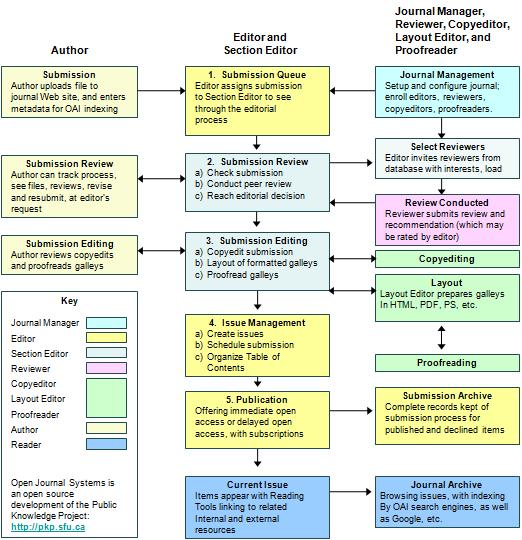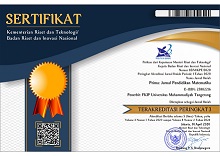- Focus and Scope
- Section Policies
- Peer Review Process
- Open Access Policy
- Publication Ethics and Malpractice Statement
- Publication Frequency
- Witdrawal of Manuscripts
- Licensing (Creative Commons) and Archiving
- Hardcopy Order
- Retraction
- Policy of Screening for Plagiarism
Focus and Scope
Prima: Jurnal Pendidikan Matematika is scientific, peer-reviewed and open access journal managed and published by Program Studi Pendidikan Matematika Universitas Muhammadiyah Tangerang, half-yearly on January and July. It aims to be open access journal platform which publishes and disseminates the ideas and researches on mathematics learning*. Its focus is to publish original research (qualitative research, classroom action research, development/design research are top priorities) and/or library analysis on how students learn mathematics and how mathematics is taught in primary, secondary or undergraduate level.
To maintain the focus, the scope of the published articles will be as follows:
- Developing mathematics learning integrated with values or character
This scope deals with researches to explore mathematics learning from affective if we refer to the view of Markku. S. Hanula or socio-cultural perspective from the works of Alan J. Bishop and Third Wave Project. - Developing mathematics learning based on the constructivist perspective
Learning mathematics is not the transfer of knowledge but the construction of knowledge. This scope refers to researches on the teachers' effort from primary until undergraduate to support and enhance students' roles and engagement in constructing mathematics knowledges and skills. It is not only about the achievement of students but also the process of learning which develop problem solving, reasoning and proof, representations, connections, communications, and high order thinking. - The development of technological-based mathematics learning tools and its use in mathematics classroom
The product of technology can be employed to support mathematics learning. Thus, researches on the development of mathematics learning tools using technology especially digital technology and its practices in mathematics classrooms are important part of journal scopes. - The development of pedagogical content knowledge for in-service and prospective mathematics teachers
One of mathematics education research focuses nowadays is prospective mathematics teachers. This scope includes all attempts to prepare and support prospective mathematics teachers on pedagogical content knowledge.
*The term 'mathematics learning' involves both teaching and learning of mathematics
Section Policies
Articles
Peer Review Process
Every submitted article is independently reviewed by at least two peer-reviewers. The review process conducted by Double Blind Peer Review Process.The decision for publication, amendment, or rejection is based upon their reports/recommendation. After being reviewed, there will be four kinds of editor decision based on reviewers’ recommendation:
- Accept Submission: The submission will be accepted without revisions.
- Revisions Required: The submission will be accepted after minor changes have been made.
- Resubmit for Review: The submission needs to be re-worked, but with significant changes, may be accepted. It will require a second round of review, however.
- Decline Submission: The submission will not be published in the journal.
Plagiarism detection of articles in this journal is carried out by using plagiarismcheckerx.com (Web Checker) and Mendeley as a Tool Reference Manager. Language used in this journal is English.

Open Access Policy
This journal provides immediate open access to its content on the principle that making research freely available to the public supports a greater global exchange of knowledge.
Publication Ethics and Malpractice Statement
Publication Frequency
Prima: Jurnal Pendidikan Matematika (p-ISSN:2579-9827 and e-ISSN:2580-2216).
Short journal title: PRIMA
For year 2017, Volume 1, Number 1-2 are scheduled for publication (January & July).
Prima: Jurnal Pendidikan Matematika is electronically published via journal website (http://jurnal.umt.ac.id/index.php/prima).
Prima: Jurnal Pendidikan Matematika is published by Program Studi Pendidikan Matematika, Universitas Muhammadiyah Tangerang.
Witdrawal of Manuscripts
Author is not allowed to withdraw submitted manuscripts, because the withdrawal is waste of valuable resources that editors and referees spent a great deal of time processing submitted manuscript, money and works invested by the publisher. If author still requests withdrawal of his/her manuscript when the manuscript is still in the peer-reviewing process, author will be punished with paying $250 per manuscript, as withdrawal penalty to the publisher. However, it is unethical to withdraw a submitted manuscript from one journal if accepted by another journal. The withdrawal of manuscript after the manuscript is accepted for publication, author will be punished by paying US$550 per manuscript. Withdrawal of manuscript is only allowed after withdrawal penalty has been fully paid to the Publisher.
If author don't agree to pay the penalty, the author and his/her affiliation will be blacklisted for publication in this journal. Even, his/her previously published articles will be removed from our online system.
Licensing (Creative Commons) and Archiving
Hardcopy Order
Authors who want to have print-out of the journal are charged for printing and shipment fee. The authors must pay IDR 100,000 for 1 exemplar. Shipment fee complies the location (http://www.jne.co.id/tarif.php)
Request for journal hardcopy can send an email to primajpm@gmail.com bearing the subject line "Request for hardcopy".
Retraction
The papers published in Prima: Jurnal Pendidikan Matematika will be considered to be retracted in the publication if:
- They have clear evidence that the findings are unreliable, either as a result of misconduct (e.g. data fabri-cation) or honest error (e.g. miscalculation or experimental error).
- The findings have previously been published elsewhere without proper crossreferencing and permission orjustification (i.e. cases of redundant publication).
- It constitutes plagiarism.
- It reports unethical research.
The mechanism of retraction follow the Retraction Guidelines of Committee on Publication Ethics (COPE) which can be accessed at https://publicationethics.org.
Policy of Screening for Plagiarism
Papers submitted to Prima: Jurnal Pendidikan Matematika will be screened for plagiarism using Plagiarism Checker X plagiarism detection tools. Prima: Jurnal Pendidikan Matematika will immediately reject papers leading to plagiarism or self-plagiarism.
Before submitting articles to reviewers, those are first checked for similarity/plagiarism tool, by a member of the editorial team. The papers submitted to Prima: Jurnal Pendidikan Matematika must have similarity level less than 20%.
Plagiarism is the exposing of another person’s thoughts or words as though they were your own, without without permission, credit, or acknowledgment, or because of failing to cite the sources properly. Plagiarism can take diverse forms, from literal copying to paraphrasing the work of another. In order to properly judge whether an author has plagiarized, we emphasize the following possible situations:
- An author can literally copy another author’s work- by copying word by word, in whole or in part, without permission, acknowledge or citing the original source. This practice can be identified through comparing the original source and the manuscript/work who is suspected of plagiarism.
- Substantial copying implies for an author to reproduce a substantial part of another author, without permission, acknowledge or citation. The substantial term can be understood both in terms of quality as quantity, being often used in the context of Intellectual property. Quality refers to the relative value of the copied text in proportion to the work as a whole.
- Paraphrasing involves taking ideas, words or phrases from a source and crafting them into new sentences within the writing. This practice becomes unethical when the author does not properly cite or does not acknowledge the original work/author. This form of plagiarism is the more difficult form to be identified.







